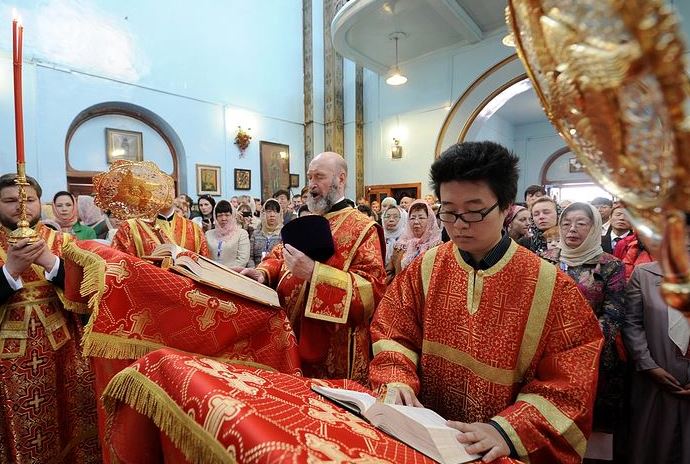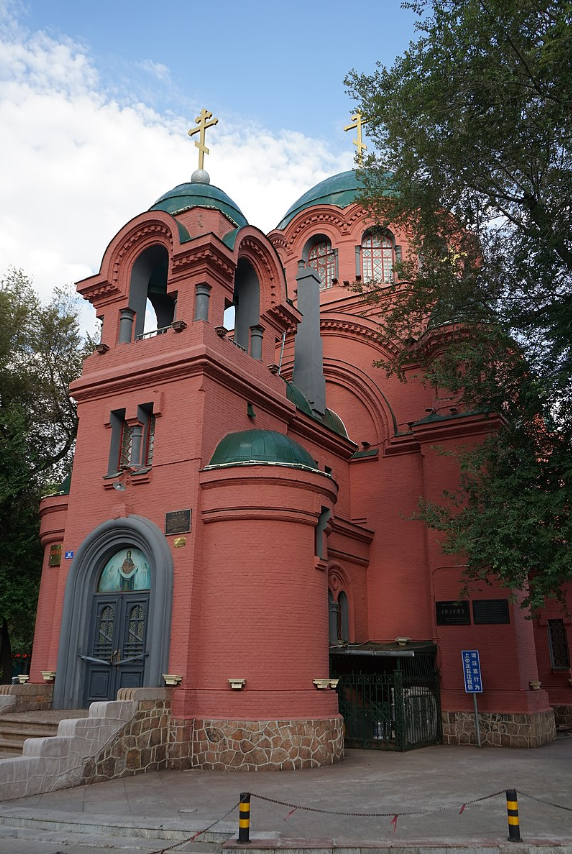
Orthodox students from the People’s Republic of China can now begin to prepare for their future ministries in China in the theological schools of the Russian Orthodox Church. Agreement on the issue came as a result of the sixth session of the Russian-Chinese working group on contacts and cooperation in the religious sphere held in Beijing on Thursday, the Vice Chairman of the Department of External Church Affairs (DECR) of the Russian Orthodox Church Archpriest Nikolai Balashov toldRIA-Novosti.

Church of the Intercession, Harbin
The meeting was held on Thursday at the Chinese State Administration for Religious Affairs, chaired by His Eminence Metropolitan Hilarion (Alfeyev) of Volokolamsk, the Chairman of the DECR, and the Deputy Chief of the Administration for Religious Affairs Chzhan Yantun.
“We touched upon a wide range of topics concerning cooperation between Russia and China in the religious sphere, including questions of training Chinese Orthodox students in the theological schools of the Russian Orthodox Church,” the statement reads.
Commenting on the results of the talks, Fr. Balashov specified to RIA-Novosti that the dialogue with the Chinese state bodies, despite the difficulties, will continue “with respect and consistency.”
“One of the main goals is to help prepare Chinese Orthodox students who will become spiritual leaders for Orthodox faithful in their country,” Fr. Balashov added. There are an estimated 10,000 Orthodox believers in the country.
The DECR Vice Chairman also noted that many Chinese Christians endured quite difficult times and preserved their faith in the years when the churches were closed and there were no priests. Fr. Alexander Yu Shi was ordained in 2015—the first Chinese Orthodox priest to be ordained in China in 60 years, which was also the result of previous Russian-Chinese talks.
“Following the first Orthodox priest after a long break, others will come to Harbin. We hope to resume regular services in Ergun, Yining, and Ürümqi, where the churches are opened but there are no priests. We hope our fellow believers will find places for prayer in other parts of this vast country. We will be consistent and patient until the normal life of the Chinese Orthodox Church is restored. The first steps towards this have already been taken,” Fr. Balashov concluded.

Praise God!!!
This is great news. I attended liturgy in Harbin when my wife and I were English teachers there during the eighties. It was a wonderful thing in 1990 to see young Soviets that were studying Chinese at Heilongjiang University come to the Nativity service and freely venerate icons and so on. This was pretty different from before when people from the USSR were extremely cautious. If there are more clergy, then more services during the week will be possible.
Imagine a midnight procession in Harbin. The last Pascha that I attended, I think it was, a lot of people were outside the fence around the church to see what we were going to do before the service began. Father Gregory Zhu even had permission to ring a bell. There were the “Lao Sulian Ren” (“Old Soviet people”) and me. I had a long beard at the time, so I sort of looked the part. In fact, there were a couple of times when I was walking along and people actually crossed themselves, I guess because they remembered that from when there were Russian priests in Harbin.
So – when will services be done in Mandarin Chinese, do you think? Orthodox mission churches long ago used Mandarin. If translation into modern colloquial language is done, services might become very attractive.
Ask Fr. Denis Posdnyaev, who is doing great work there.
In fact it is not a news. We already hold this practice long time.
I look forward to seeing this. I am actually moving to Beijing in July, and hope to find a church in Beijing.
Rudy – go to the Russian Embassy and their consulate in Shanghai for services. Brush up on your Church Slavonic. Father George Sondergaard of blessed memory gave me a bi-lingual prayer book that had the liturgy, English on one side, Slavonic on the other. That helped me when I was in Harbin.
I didn’t realize that Orthodoxy was so small in China was so small
Lack of clergy leadership has made it difficult to grow the Church. The faithful Chinese Orthodox have endured much, and their endurance is paying off. The Chinese Orthodox church is going to grow.
Congratulations.
May Holy God bless.
Keep me regularly au courant,
Ronald
For a photo and so on about the open Orthodox church in Harbin, China, see
en.wikipedia.org/wiki/Church_of_the_Intercession,_Harbin
We should run photos of this church (where I attended in the eighties) rather than the Church of the Holy Wisdom in the picture with this article which is a museum now. Also, the St. Nicholas Cathedral was the cathedral in Harbin until it was destroyed in 1966 at the start of the Cultural Revolution.
Done!